CARMEN
2023–2024 AUDIENCE DISCOVERY GUIDE



Dear Friends,
Opera is an incredible unification of all the artistic disciplines and we hope that you have a wonderful time at our production of Bizet’s Carmen.
Producing opera is no easy task, and what you will see on the stage is the culmination of months of hard work from directors, conductors, designers, technicians, musicians, marketing staff, and of course, SINGERS.
We hope you will share the details of this exciting experience with your friends and family, and share the passion for this incredible art form with them!
See you at the opera,
 of Engagement and Civic Practice
of Engagement and Civic Practice


The blood of passion surges and spills in one of the most beloved and widely performed works in operatic history. Animated by an all-star cast and audacious stagecraft, the conflicting worlds and failed romance of the sensual, rebellious Carmen and the possessive military man Don José absolutely burst off the stage.
From the stirring Toreador Song (" Votre toast, je peux vous le rendre") to the tauntingly seductive Habanera ("L'amour est un oiseau rebelle"), Georges Bizet’s enduring and richly coloured melodies transcend the hummable; they don’t just gesture towards emotions, they embody the many shapes and shades of passion, from infatuation to violent jealousy.
Carmen wasn’t well-received when it debuted in 1875, but Bizet’s final masterpiece has since become a perennial audience favourite and a powerful artistic platform to explore class conflict and gender inequality.
The Inside Vancouver Opera Podcast is a unique backstage glimpse into the world of Vancouver Opera.
Join us as we chat with opera experts, artists, Vancouver Opera staff and others to explore the world of opera on and off the stage.
This podcast offers an insider’s glimpse into the artistry, experiences, and perspectives of the talent involved in taking breathtaking opera productions from the page to the stage.
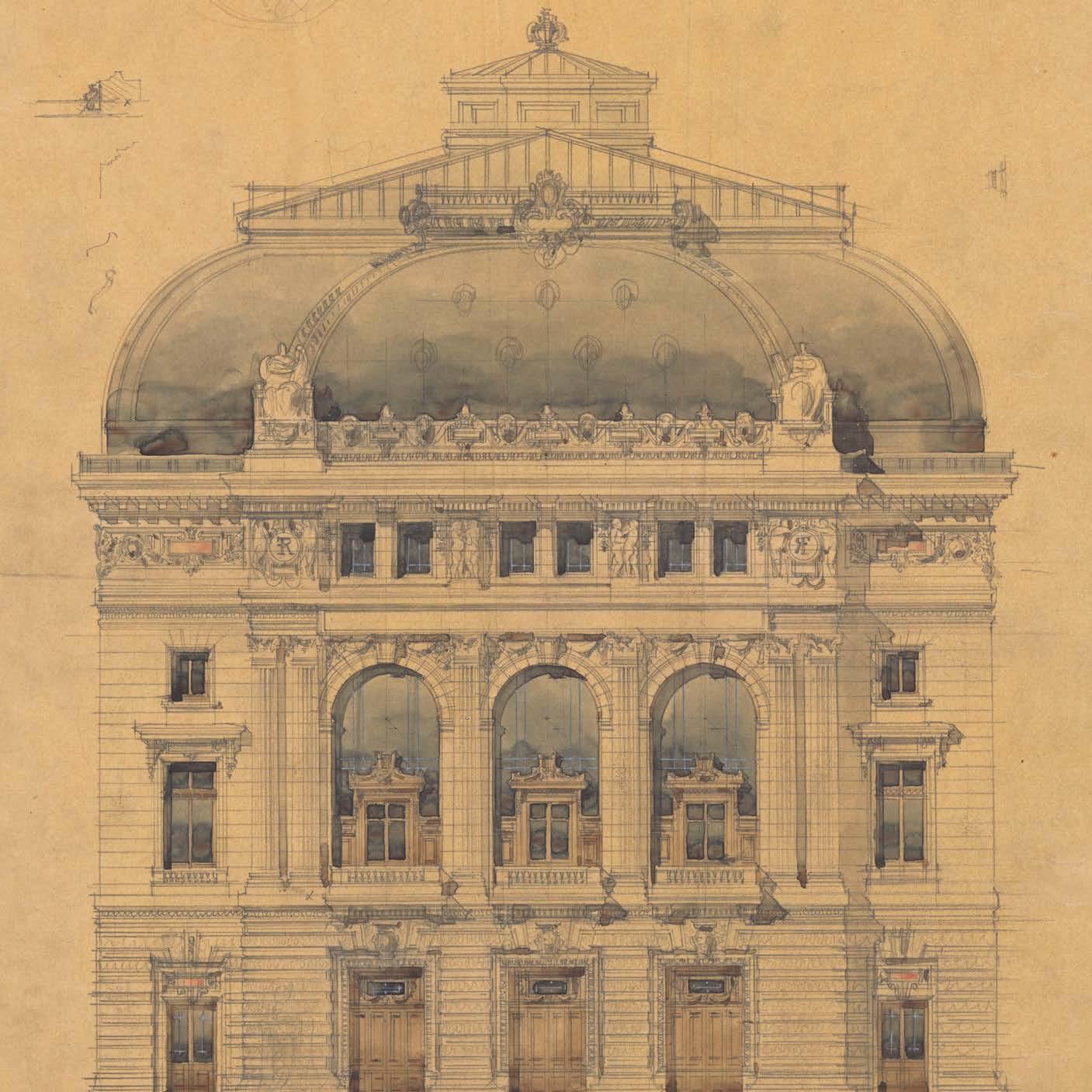
Opéra-Comique is a style of opera made famous in France during the late 1700s and into the 1800’s. Originally the name of a theatre in Paris - the Théâtre National de l'OpéraComique, the name later came to mean the style of opera itself which combined dialogue with musical numbers such as arias, ensemble singing and choruses.
Influenced by Italian Buffa (comic) opera before it, French Vaudeville, and English Ballad opera, Opéra-Comique incorporated both classical and popular music and drew on folk, dance, and traditional music to create a sense of time and place. While the name OpéraComique implies a more lighthearted style, traditionally many operas in the genre, including Carmen, explore serious themes and tragic characterizations while incorporating moments of comedy in the opera’s artistic expression.
George Bizet’s Carmen is perhaps one of the most famous operas in the Opéra-Comique tradition, but there are many other well known operas in this genre such Giachino Rossini’s The Barber of Seville, and Jacques Offenbach’s Orpheus in the Underworld
Opéra-Comique may have its roots in the past, but it is still a vibrant part of the French cultural landscape today, and around the world, as directors and opera companies continue to embrace the genre with its appealing and accessible style.
1
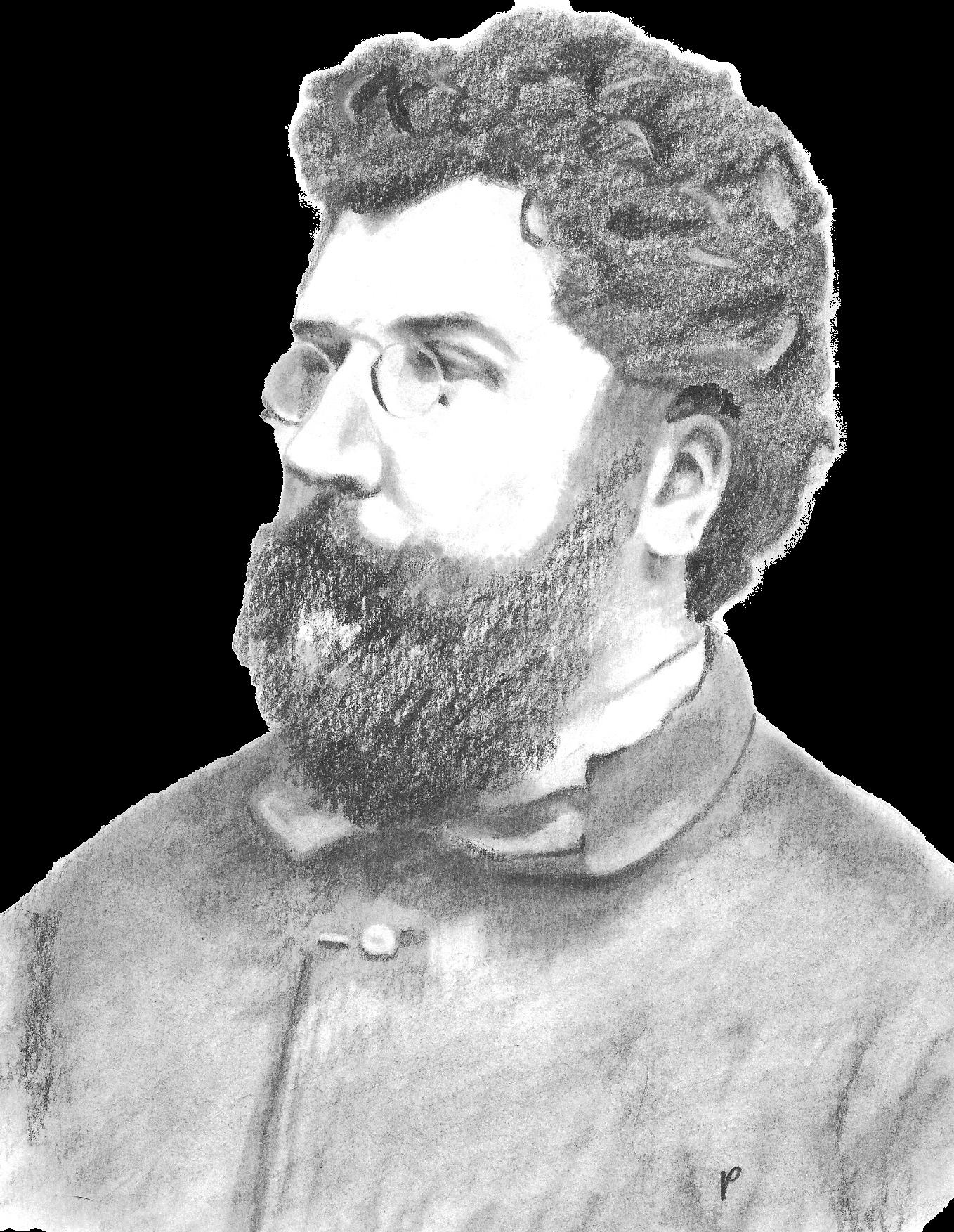
1838 Georges Bizet was born on October 25 in Bougival, near Paris.
2
At the young age of nine, Bizet’s emerging musical talent earned him a place at the Conservatoire de Paris.
3 Bizet composed his first opera, La Maison du Docteur at age 17 in 1855.
7
4
5
In 1857, at19 years old, Bizet won the prestigious Prix de Rome, an annual competition hosted by the Académie des Beaux-Arts which allowed him to study in Rome for 3 years.
When the Franco-Prussian War broke out in July 1870, Bizet enlisted in the French National Guard along with other wellknown composers such as Massenet and Saint-Saëns.
8
Carmen premiered at the Opéra Comique on March 3, 1875 to poor reviews but still managed a 47-performance run.
Bizet died on June 3, 1875 at only 36, on the evening of the 33rd performance of Carmen and on his 6th wedding anniversary.
6
In 1873, Bizet composed Carmen , based on the novella by Prosper Mérimée written in 1845.
9
10
Bizet was buried at the Père Lachaise Cemetery in Paris, and 4,000 people attended his funeral.
Bizet never achieved financial and professional success during his lifetime, and instead struggled to make a name for himself. It wasn’t until after his death that he became famous for his considerable contribution to French opera.
Tchaikovsky, the great Russian composer, once said Carmen would one day be the world’s most famous opera. And he was right!
LEARN MORE ABOUT BIZET'S LIFE AND TIMES
bit.ly/Bizet





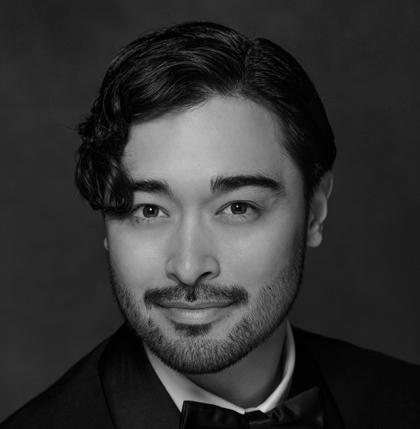



Don
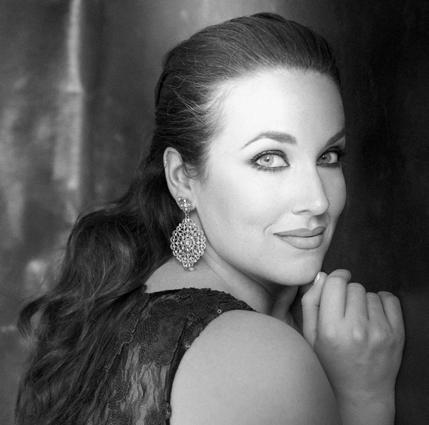



Everyone is drawn to the irresistible Carmen, except Corporal Don José. But even he soon succumbs to her seduction, leaving his military life to join the world of the Romani, all in Carmen’s name. But when the famous bullfighter Escamillo attracts Carmen’s affections, a dangerous love triangle grows. Micaëla, Don José’s hometown sweetheart, tries to keep him from Carmen’s grasp, but fate has already dealt its hand. With its twisting tale of romance, deceit, and disaster set to magnetic melodies, Bizet’s masterpiece, Carmen, has become one of the world’s most popular operas.
On a blistering day, soldiers hang out and watch people go by. The shy, pretty Micaëla comes looking for Corporal Don José, but he’s not there. The soldiers try to get Micaëla to stay by flirting with her, but she leaves.
Soon after, Don José arrives as the guards change shifts. The cigarette factory bell chimes, and women come out for their smoke break. The men flirt with the factory girls, too. Carmen comes out last, and everyone is drawn to her, except Don José. Rising to the challenge, she sets eyes on him, sings “love is a rebellious bird that no one can tame” and throws him a flower. Laughing, she and the other women return to the factory. Don José hides the flower in his uniform.
Micaëla returns with a letter from Don José’s mother, who begs him to marry Micaëla. As he reads the letter to himself, Micaëla leaves.
Suddenly, screams come from the factory. Carmen has gotten into a fight with another girl and slashed her face with a knife. Lieutenant Zuniga questions Carmen, who replies with a mocking “tra-la-la.”
Don José is ordered to guard Carmen while Zuniga gets a warrant for her arrest. Alone with Don José, Carmen seduces him into making a plan that will let her escape. Zuniga returns with Carmen’s formal arrest orders. As she’s being led away to prison, Carmen pushes Don José and escapes through the confused crowd.

In our latest Opera In a Nutshell, the charismatic singer/synopsisist Spencer Britten (or, more accurately many Spencer Brittens) takes us on a merry sprint through the plotlines and characters that drive Bizet’s beloved masterpiece, Carmen!
WATCH THE CARMEN OPERA IN A NUTSHELL
bit.ly/Nutshell-Carmen
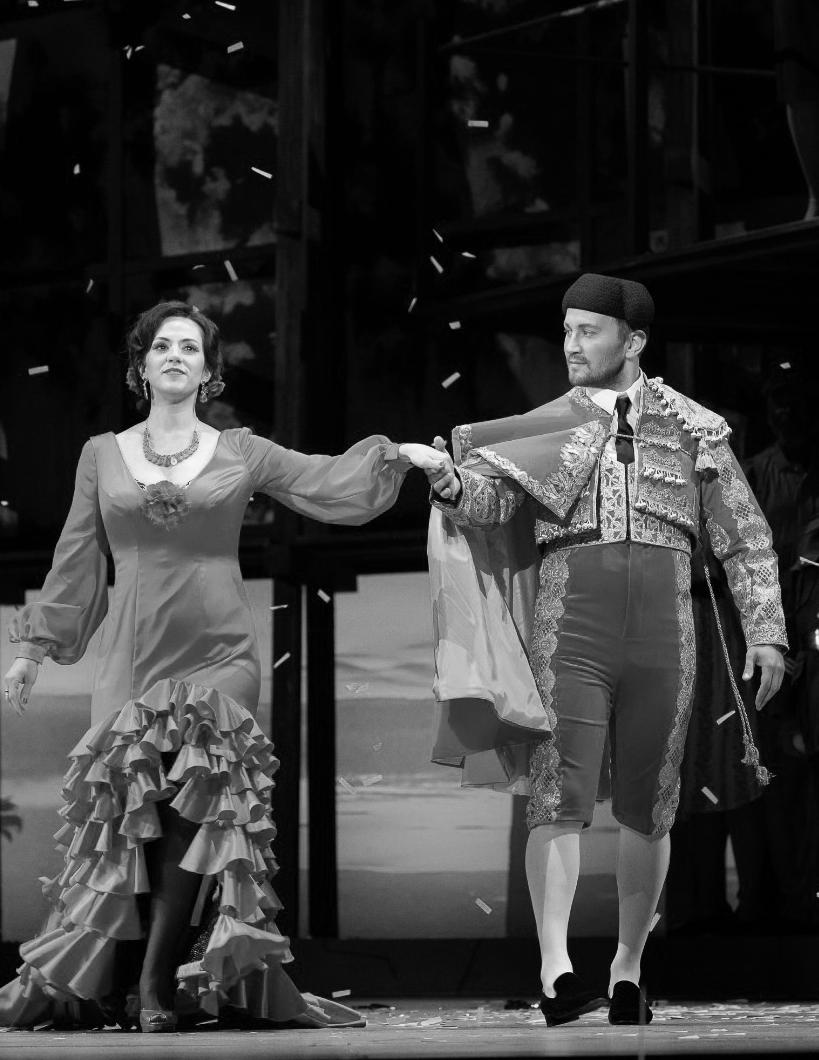
Months later, Carmen and her friends Frasquita and Mercédès have fun singing and dancing for the soldiers late at night in Lillas Pastia’s tavern.
Carmen hears that Don José, who was sent to prison because he let her escape, was released the day before. The famous bullfighter Escamillo arrives, and everyone is star struck. He sings about his adventures in the bullring and flirts with Carmen, but she’s not interested. The soldiers and Escamillo leave as the smugglers Dancaïre and Remendado join Carmen, Frasquita and Mercédès. They need to deliver their smuggled goods and want the three women to join them. Carmen says she can’t go because she’s in love, but nobody believes her.
Don José arrives and the others leave Carmen and Don José alone. He tells her how much he loves her. A trumpet signals that the soldiers must report back to the barracks. Don José says he must leave, but Carmen mocks his loyalty to the military. Don José proves his love by pulling out the flower she threw at him when they met. That’s not enough for Carmen; she wants him to leave the army and join her free-spirited life. Don José tells her he could never leave the military.
Zuniga shows up to see Carmen and orders Don José to leave. José refuses and draws his sword. The smugglers burst in, interrupt the fight, and tie up Zuniga. Don José has no choice but to flee with the smugglers.
Late at night, the smugglers carry their goods through the mountains outside of town. Carmen’s love for Don José is fading and the two bicker. She tells him to go home to his mother.
Frasquita and Mercédès read their fortunes in cards, but when Carmen tries, she only sees her and Don José’s deaths. Planning to distract any guards, the women join the smugglers on their trip to the city. Don José stays behind to watch the camp.
Micaëla has found her way to the smugglers’ site, looking to take Don José away from Carmen. Micaëla hides after seeing Don José shoot at and barely miss Escamillo, who is there to see Carmen. The Toreador claims the two of them are in love. Don José challenges him to a duel, but the fight is cut short when the smugglers return.
After Escamillo leaves, Remendado finds Micaëla hiding. She tells Don José that his mother is dying. As Don José rushes off with Micaëla, Escamillo’s voice is heard in the distance.
Outside the bullfighting ring, merchants hawk their wares. Zuniga tells Frasquita that an order has been issued for Don José’s arrest.
The crowd cheers Escamillo as he enters, and he and Carmen express their love for each other. As the throng enters the arena, Frasquita warns Carmen that Don José is somewhere in the crowd. Carmen says that she is not afraid and stays behind to confront him. Disheveled and crazed, he emerges from the shadows and begs Carmen to start a new life with him. Carmen says everything is over between them. Carmen tries to go into the arena and Don José blocks her. Carmen says that she loves Escamillo. Enraged, Don José fatally stabs her. The crowd exits the arena with a victorious Escamillo to find Don José standing over Carmen’s lifeless body.
Summary courtesy of Opera Philadelphia, slightly edited for length.
PHOTO BY STEVEN PISANO FOR OPERA PHILADELPHIAFor Carmen, all the costumes are already designed and built from the Opera Philadelphia’s production, but sometimes they don’t fit, so it’s up to Roberta and her team of cutters and stitchers to tailor them so they do fit. If they can’t do that, they build them from scratch!

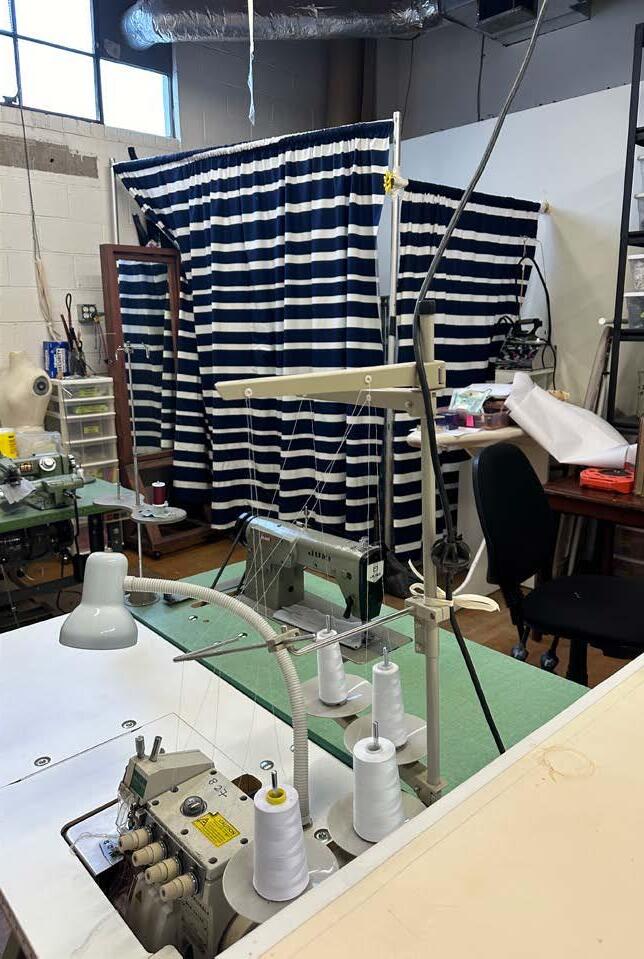

Illustrated by Christopher Souza
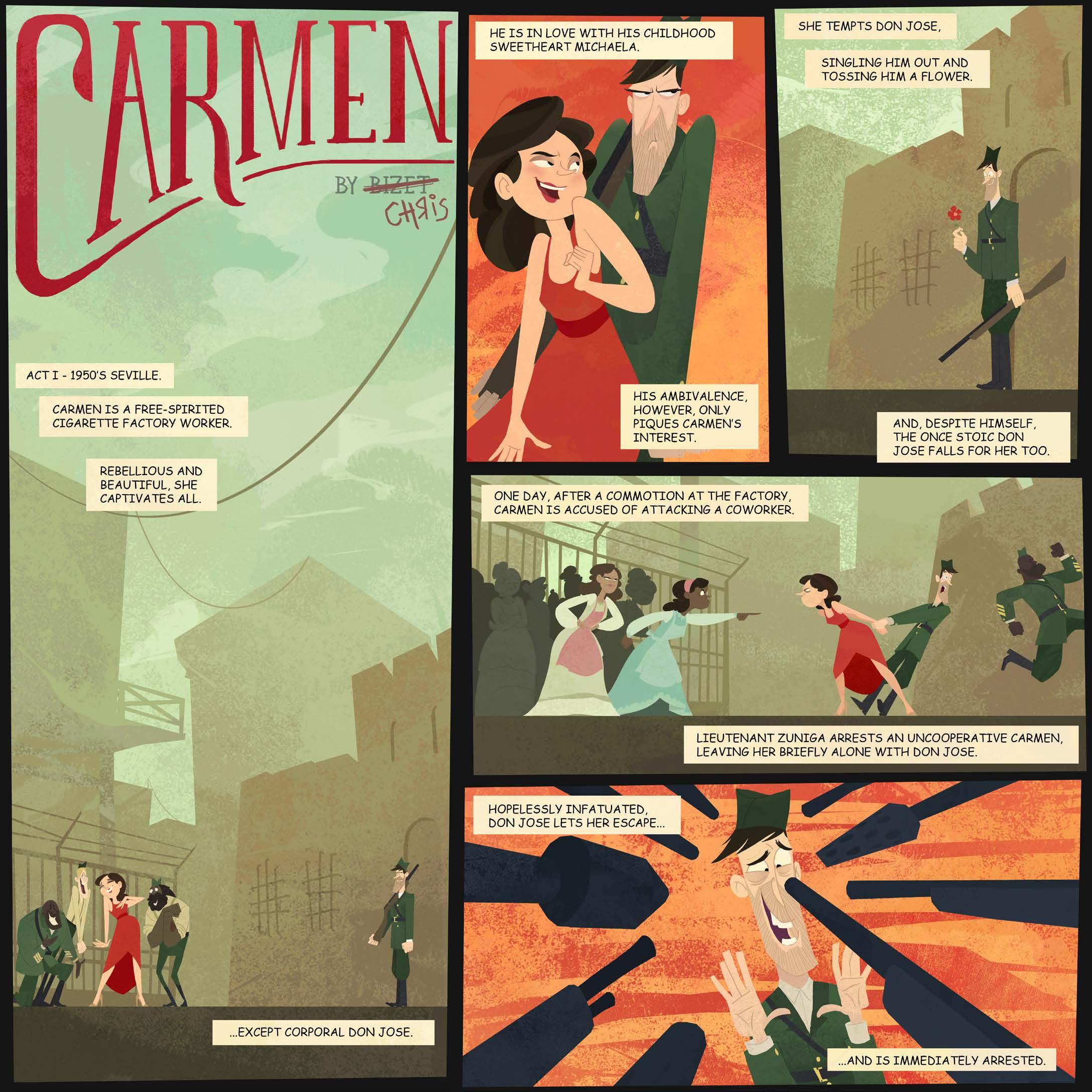
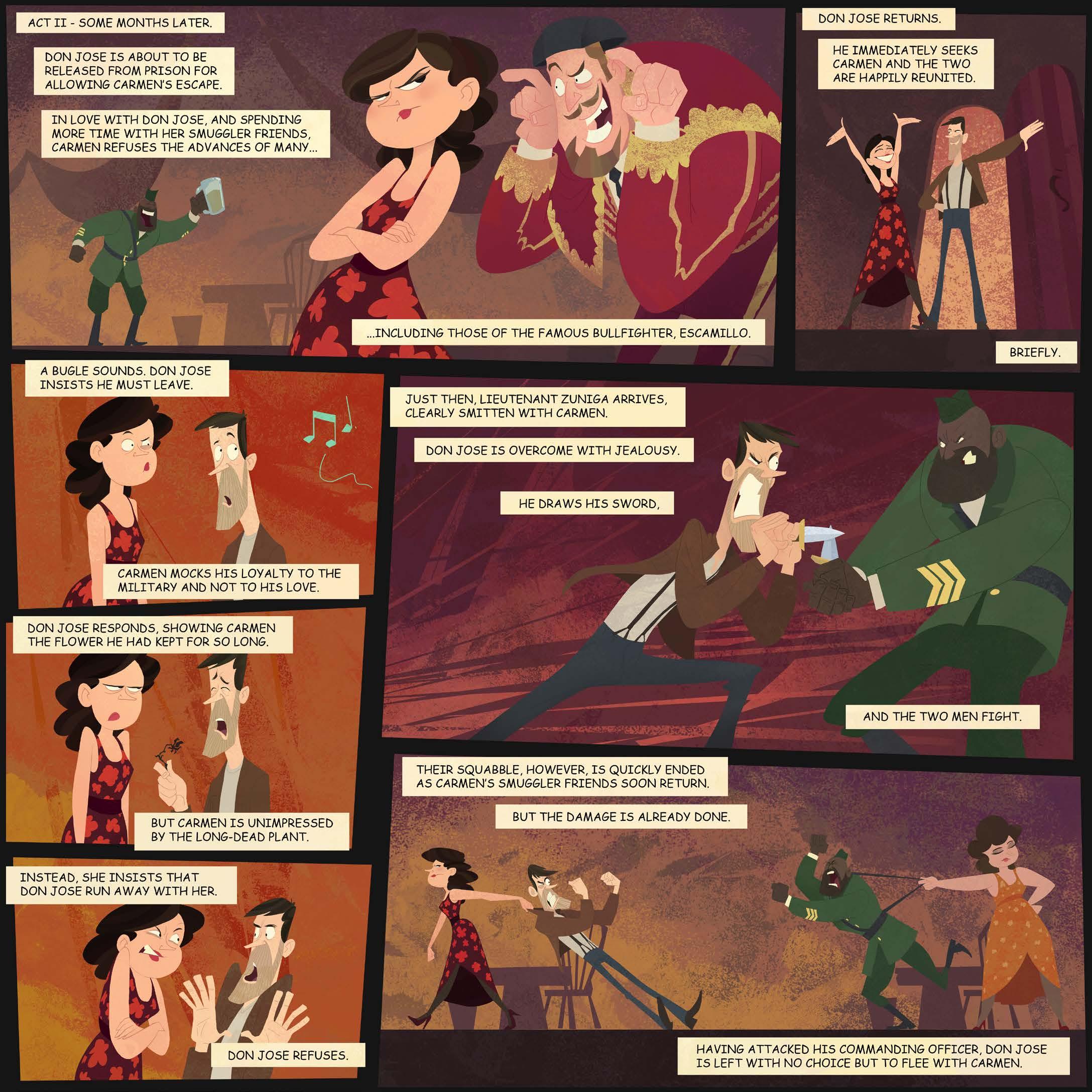
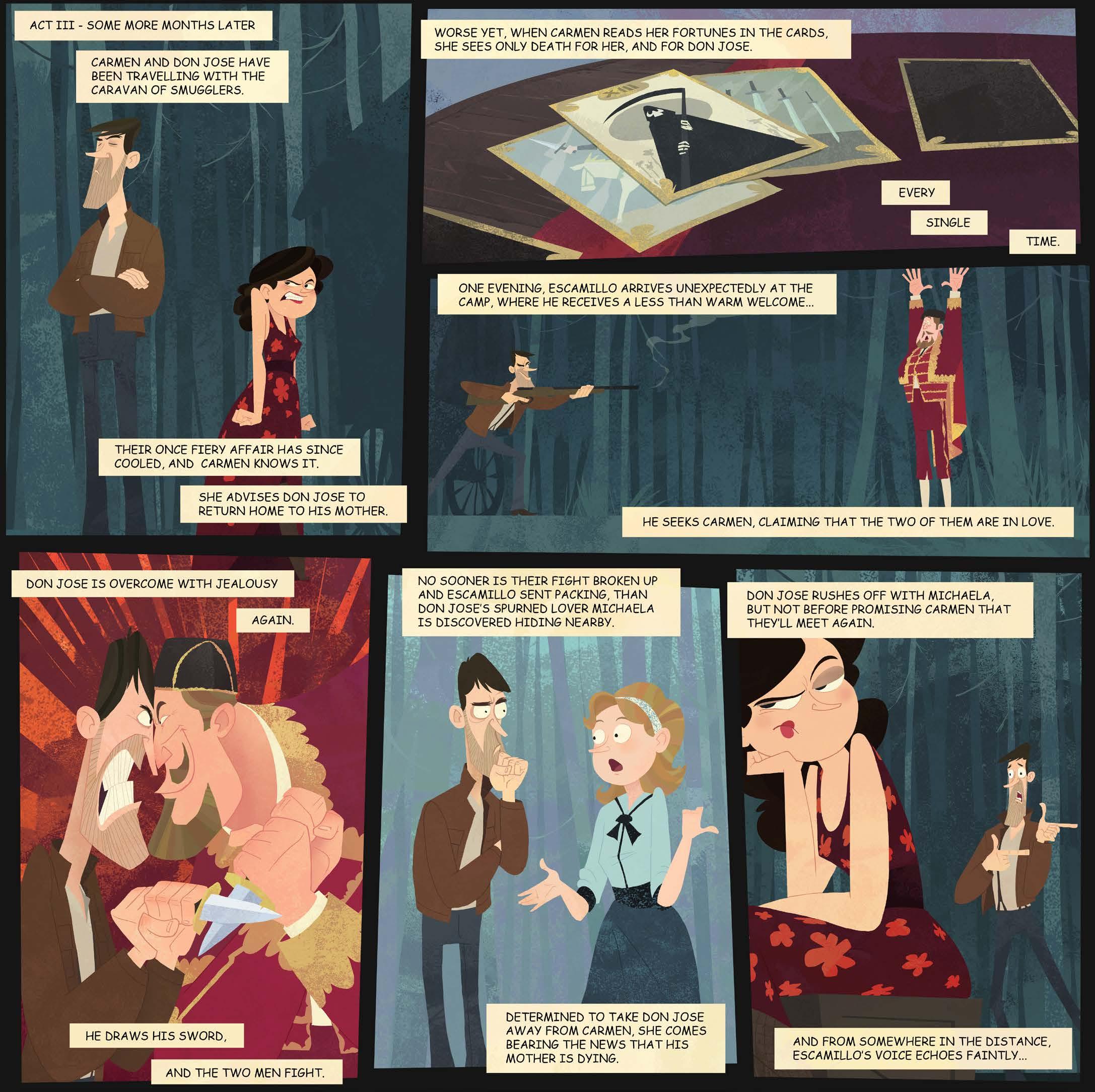

Opera came from Italy, just like gelato! The word opera means ‘work’ in Italian, as in work of art, not homework.
Opera is a group effort by conductors, musicians, singers, dancers, set designers, costume creators, lighting experts, directors, theatre staff, make-up artists, wig makers, carpenters, prop designers, and more, to tell a story, sing, dance, and entertain the audience all the same time.
Unlike Drake or Taylor Swift, opera singers don’t use microphones. Instead, they learn to project their voices. They may go from projecting over the sound of the live orchestra in one moment, to dropping to a near whisper in the next moment (just like your school principal during assemblies).
To protect each other’s hearing, opera singers cannot face directly towards each other while singing. Ear plugs are not allowed.
Opera singers often have as many years of education as physicians, and must continue training throughout their career.
Operas can be up to four hours long, which may be how long French class feels, but at least you don’t have to wear a costume, make-up, possibly a wig, sing and dance under hot lights, and memorize an entire opera, like the performers do.
Composers write in their language, and sometimes in second or third languages too, so opera singers must often learn English, French, German, Italian, and even Russian and Czech if they want to perform worldwide. And in case you’re wondering, ‘ice cream’ in Czech is ‘zmizlina’.
If you were a top opera singer, you could make as much as $20,000 per performance.
Singers must learn to brush off negative reviews in time to perform the same show the following night.
Opera has been around for as long as gelato, which is just over four hundred years.
Acts and scenes are ways of categorizing sections of operas. An act is a large-scale division of an opera, and each opera will typically include from two to five acts. Acts can be subdivided into scenes, which are often differentiated by a change in setting or characters.
Literally “at ease,” adagio is a tempo marking that indicates a slow speed. An adagio tempo marking indicates that the performer should play in a slow and leisurely style.
Italian for “cheerful” or “joyful,” Allegro is the most common tempo marking in Western music, indicating a moderately fast to quick speed.
A song for solo voice accompanied by orchestra.
Italian for "nicely done"; shouted by audience members after a performance. "Bravo" for men, "Brava" for women, and "Bravi" for all.
A section of an opera in which a large group of singers performs together, typically with orchestra accompaniment.
A gradual raising of volume in music achieved by increasing the dynamic level. When music crescendos, the performers begin at a softer dynamic level and become incrementally louder.
A musical piece for two or more soloists, accompanied by orchestra. Types of ensembles include duets (for two soloists), trios (for three soloists), and quartets (for four soloists).
Meaning “loud” or “strong” in Italian, forte is a dynamic level in music that indicates a loud volume. Adding the suffix “-issimo” to a word serves as an intensifier—since forte means “loud,” fortissimo means “very loud.”
The text of an opera, including all the words that are said or sung by performers.
An instrumental piece that occurs before the first act as an introduction to an opera.
Speech-like singing in-between musical numbers that advances the plot.
The complete musical notation for a piece, the score includes notated lines for all of the different instrumental and vocal parts that unite to constitute a musical composition.
Literally “time” in Italian, tempo refers to the speed of a piece of music.
A. The group of instrumentalists who accompany the singers.
B. The lower male voice.
C. Sung dialogue that propels the action forward.
D. The music that the composer wrote.
E. A piece of music with two singers.
F. The highest male voice.
G. The person who creates the vision of the production, sets staging, and guides designers and singers.
H. The person who creates the vision of the production, sets staging, and guides designers and singers.
I. The words that a composer sets to music.
J. The highest female voice.
K. The people who work backstage.
L. An extended musical solo.
M. Music at the beginning of an opera.
N. Designs the dancers’ movement.
Times and values have changed since Bizet composed Carmen in 1875, and some today may find it hard to relate to the behaviours and decisions of the characters.
After you have watched the performance, work in pairs and choose a character whose decisions or behaviours intrigued you, and engage them in a discussion. Ask them questions about their choices, and then respond on their behalf.
Use a DM or texting generator.
Why are the male characters so full of jealousy and rage?
What negative stereotypes exist in Carmen?
What role does Michaëla’s character play?
What is a Habanera?
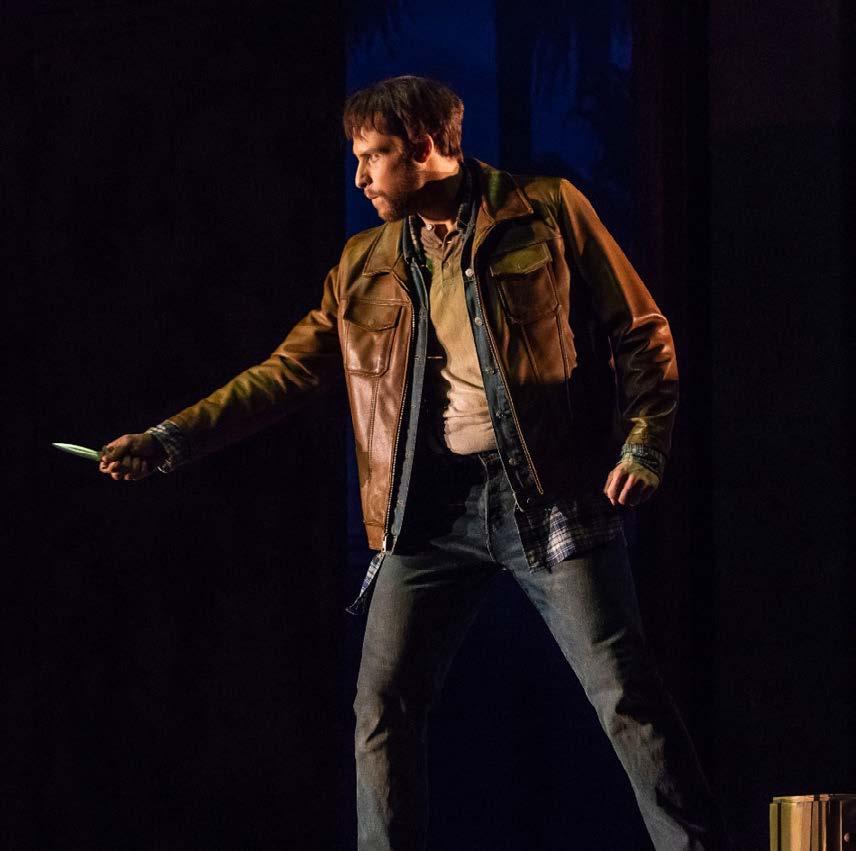
Compose a series of emails.
Go Old School and write a letter.
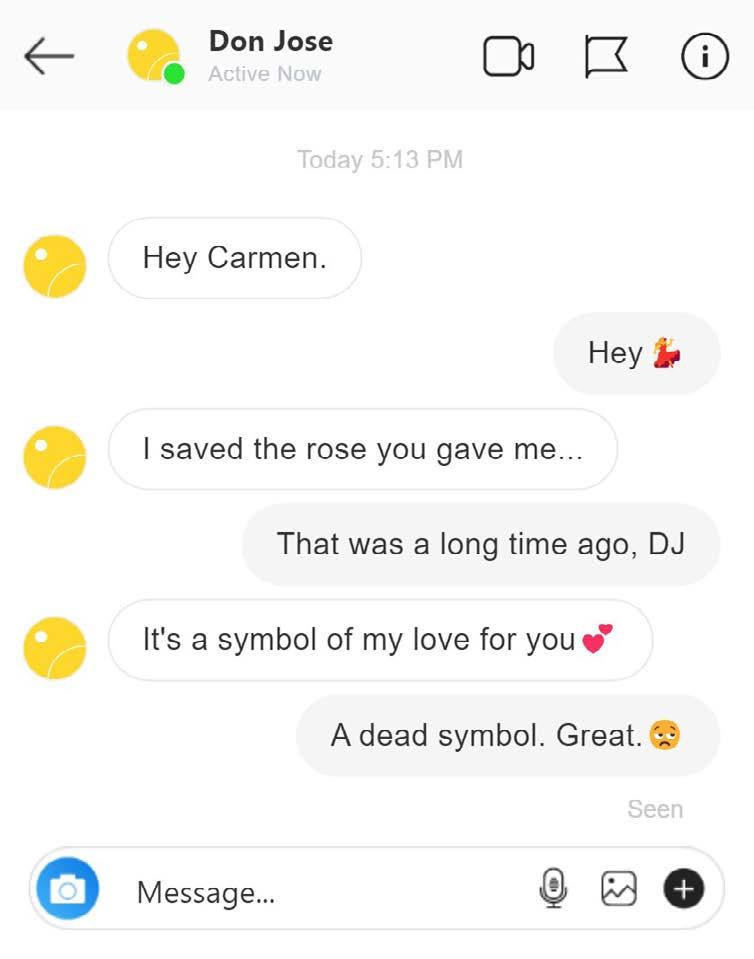
Resources:
Generate a chat transcript